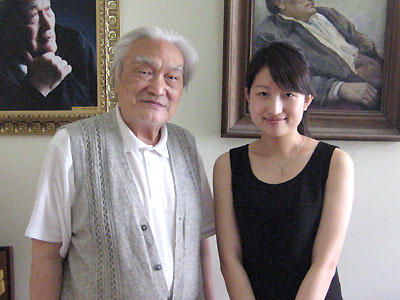 Zhao Chunzhe
Zhao Chunzhe |
For some, collecting is a hobby that brings many memories and not just monetary value.
And Gu Bingfu has collected Olympic and sports souvenirs for 50 years.
The former director of the China Gym Museum and a member on the Chinese Olympic Committee, talked to Zhao Chunzhe of chinadaily.com.cn about his Olympic collection.
 Gu Bingfu (L) poses for a photo in his home during an interview with chinadaily.com.cn, July 2, 2008. [chinadaily.com.cn]
Gu Bingfu (L) poses for a photo in his home during an interview with chinadaily.com.cn, July 2, 2008. [chinadaily.com.cn] |
Chinadaily.com.cn: When did you start your Olympic collection?
It all started half a century ago when I started working as a reporter for the “New sports” Magazine which is part of the National Sports Bureau.
When I was in my early 20s, I first collected sports stamps. My favorite collection is a stamp book featuring all of the International Olympic Committee (IOC) presidents’ portraits. It was a gift from former IOC presidentJuan Antonio Samaranch.
I met him in Lausanne, Switzerland when I was an exhibitor at the first Olympic stamps exhibition. Samaranch gave me the stamp book as a souvenir.
After I came back to Beijing, I showed everyone my stamp book and felt very proud. But some of my colleagues doubted whether it was really from Samaranch – they even made fun of me.
The next year, I got another chance to meet Samaranch again, and I told him my friends didn’t believe I got the stamp book from him personally. Samaranch laughed and signed on the book right away. It became my most precious Olympic collection ever.
What else is in your Olympic collection?
I collect stamps, photos of more than 130 Chinese Olympic gold athletes, and many other things like key rings, and Swiss army knives.
How much money have you spent on your Olympic collection?
I’m not a rich man; I earn little and I have a family to support. I don’t have much money to invest in my collection. I just do what I can.
How much do you think they are worth now?
I have lots of things in my Olympic collection, but I’ve never had them appraised. I am sure the money I invest in those collections is not so much. The most expensive things in my collection may be worth 4,000 yuan. My collection brings me lots of enjoyment.
Is your family supportive of your hobby?
Ha! My wife sometimes complains about it because she says I spend too much money on these things, but on the whole she is supportive. Without her understanding, I cannot collect all the things I like, because she is the family chief financial officer!
Compared to other Olympics, what do you think about the Beijing Olympic souvenirs?
Compared to the Atlanta and Seoul Games, I think the Beijing Olympic Organizing Committee (BOCOG) has issued too many souvenirs. There are over 10,000 items for sale. The reason why BOCOG is doing this is to make money to finance part of the Olympic Games. I’ve bought some souvenirs myself, but I don’t think all the items will be worth much after the Games.
What makes you think one item is more valuable than another?
The value of an item should be judged by three factors: authenticity, fine craftsmanship and limited editions. Here’s an example: Some limited-edition copper badges issued after China’s successfully bid for the 2008 Olympics, sold for 300 yuan apiece in 2001. Many people thought they were too expensive. However, the price of the badges went up to 700 yuan the next year, and rocketed to 10,000 yuan now.
Gold coins are worth collecting, and Olympic posters, tickets and phone cards also have great value over time. If you’re a first-time collector, make yourself an expert in one category, but it’s impossible to collect every single item in that category. The upcoming Olympics will prepare you to be a long-term Olympic collector.
Have you made any money from your collection?
I want to clarify that I am a collector, not an investor. I bet collectors will keep their collection more as a souvenir rather a way to make money.
I won’t sell any of my collection, but my fellow collectors and I like to made trades with each other to enhance our collections.
Trading is important because sometimes you can’t buy what you want.
But at the same time, we should avoid being too materialistic. After all, having a hobby is to amuse oneself. If one is so focused into making money, he is losing the fun of collecting.
Instead of making money, I am investing in my hobby. Now, I have retired, and I have started collecting more things that don’t cost anything. For example, a soft drink aluminum can with an Olympic gold winner’s portrait or a newspaper with an Olympic theme. Anyway, I plan to donate my entire collection to the country in the future.